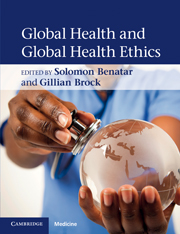Book contents
- Frontmatter
- Contents
- List of contributors
- Introduction
- Section 1 Global health, definitions and descriptions
- Section 2 Global health ethics, responsibilities and justice: some central issues
- 6 Is there a need for global health ethics? For and against
- 7 Justice, infectious diseases and globalization
- 8 International health inequalities and global justice: toward a middle ground
- 9 The human right to health
- 10 Responsibility for global health
- 11 Global health ethics: the rationale for mutual caring
- Section 3 Analyzing some reasons for poor health
- Section 4 Shaping the future
- Index
- References
9 - The human right to health
Published online by Cambridge University Press: 01 March 2011
- Frontmatter
- Contents
- List of contributors
- Introduction
- Section 1 Global health, definitions and descriptions
- Section 2 Global health ethics, responsibilities and justice: some central issues
- 6 Is there a need for global health ethics? For and against
- 7 Justice, infectious diseases and globalization
- 8 International health inequalities and global justice: toward a middle ground
- 9 The human right to health
- 10 Responsibility for global health
- 11 Global health ethics: the rationale for mutual caring
- Section 3 Analyzing some reasons for poor health
- Section 4 Shaping the future
- Index
- References
Summary
Introduction: The global health duty
It is hardly news that the health and life expectancy of many of the peoples of the developing world is truly shocking. For example, according to one source, in 2009 life expectancy at birth was over 82 for those born in Japan, but, astonishingly, around 32 for those born in Swaziland (Central Intelligence Agency (CIA), 2009). If this figure is to be believed then it may well be that adult male life expectancy in Swaziland is as low as it has ever been, or at least not far above.
The crisis in global health is staggering (Garrett, 1995). Within political philosophy this crisis intersects with the topic of global justice, which has seen a surge in interest in recent years (Rawls, 1999; Pogge, 2002; Caney, 2005; Brock, 2009a). However in the mainstream of political philosophy the health agenda remains relatively undeveloped, typically focusing on a small number of issues, such as redistributive transfers (Sreenivasan, 2002), the health brain drain (Brock, 2009b) and access to medicine and drug discovery (Pogge, 2005), although a broader agenda is also beginning to emerge (O'Neill, 2002; Childress, 2002; Benatar et al., 2003, 2009; Daniels, 2006).
Philosophical debates need to absorb a wave of critical examination of existing policies both from development commentators (Easterley, 2006; Collier, 2007; Moyo, 2009) and the health activist literature (Global Health Watch, 2008) which suggest that traditional forms of assistance are far less effective than their proponents hope or believe.
- Type
- Chapter
- Information
- Global Health and Global Health Ethics , pp. 108 - 118Publisher: Cambridge University PressPrint publication year: 2011
References
- 5
- Cited by



